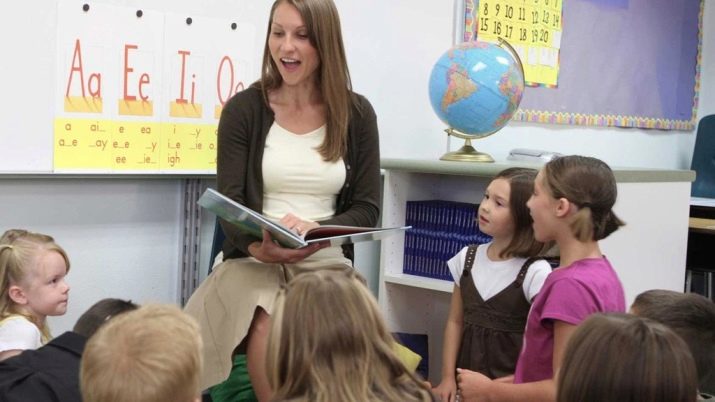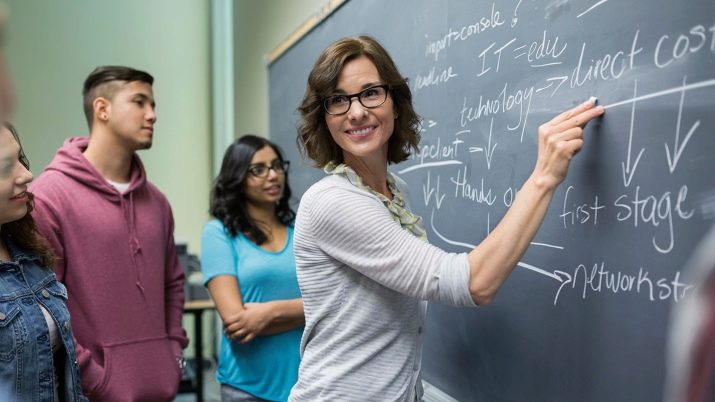All about the profession of an English teacher

Teacher is one of the most interesting, but also the most difficult professions. This is especially true for languages, because the student needs not only to correctly explain everything and teach the basics of speech, but also to instill a love for the subject so that, if desired, he can move on on his own. In this article we will talk about such a specialty as an English teacher, its features, positive and negative aspects.
Description
Foreign language teaching - this is a multifaceted and difficult process, in which the teacher plays a vital role.
A good teacher must thoroughly know his subject, because in English there are many grammatically complex rules, phrases, idioms. Incompetence is unacceptable here.
In addition, it is important for the teacher have psychological skills of communication with people, and especially with children: you need to find an approach to them, including difficult and hyperactive guys, convince them that they need this knowledge.

In teaching English one of the main aspects is knowledge of British culture, her customs, traditions, holidays. This story needs to be conveyed to the students, because awareness of the culture of the target language will help them quickly find a common language with a native speaker, if you have to communicate with him in adulthood.
Knowledge in politics, fashion, cooking, social life, business is no less important. The ability to speak on these topics will allow students to learn the language faster and more interestingly, since in everyday life you need to be able to maintain a conversation about everything.
English teachers can work in the following locations:
- kindergartens and schools;
- technical schools, lyceums, higher educational institutions;
- large companies that need to train employees in certain vocabulary;
- tutoring centers.
Most acute the lack of staff is felt in schools... We can say that it is not easy for teachers here due to the heavy workload.

Their responsibilities are:
- drawing up lesson plans and teaching them;
- filling out gradebooks, as well as electronic journals;
- constant communication with the parents of the students;
- the use of innovative technologies: the most effective are those lessons where video shows, listening to dialogues, drafting projects are taken as a rule;
- filling out various documents, maintaining a portfolio;
- collection of a material base, which includes textbooks, video and photographic materials, printouts, magazines (if the teacher has his own office);
- checking notebooks, homework assignments, conducting tests and tests;
- assistance in organizing extracurricular activities, for example, accompanying students to an exhibition, nature, to a museum;
- if the children are small, staging various thematic matinees and scenes with them is added to the list of responsibilities.
Many people find it easier to work in a higher educational institution, since here at least there is no requirement to keep in touch with parents, build discipline, organize trips and holidays.

Separately, it must be said and about work in large firms, where teachers are hired to train staff. Usually, this is not a general course, but a narrow specificity: business, technology, computer programs, etc. Here it is important for the teacher to develop his own effective teaching plan, and this is a rather difficult task.
Advantages and disadvantages
There are no ideal professions that would be liked by every aspect, there are advantages and disadvantages everywhere. Consider what they are in the specialty of an English teacher.
Pros:
- daily communication with a large number of people, so the teacher never feels lonely;
- joy and a sense of pride in oneself with the visible results of their work, the desire of students to attend lessons and assimilate knowledge;
- constant creative development, visiting theaters, exhibitions, museums;
- respect for the profession, because many people understand how difficult it is;
- long vacation, which is two or more months, the ability to quickly earn time off;
- paid vacations, sick leave, social protection;
- a large number of vacancies in a variety of institutions.

Minuses:
- unstable schedule: after work, you often have to stay to check notebooks, fill out journals, attend a parent meeting;
- the need to maintain a lot of documents, draw up plans, but if the teacher's workload is large, such documentation will take a lot of effort;
- responsibility for students: during the lesson, the teacher should not leave the children alone, you need to monitor them during breaks;
- participation in events that may be unpleasant for teachers: rallies, elections, cleaning of the territory;
- salary, which does not always correspond to the efforts made by the teacher;
- the possibility of a long and morally difficult conflict between teacher and student, as well as between teacher and parent;
- very rapid emotional burnout, since the teacher devotes a lot of effort to educate children in a quality manner.

Necessary qualities
To work as a teacher and see the result of your efforts, it is necessary to have a number of important qualities for this specialty: both personal and professional.
Professional
A true professional in his field always attracts the attention of others.
Everyone wants to learn from such a teacher, because they trust him and know that he thoroughly understands his subject.
The professional qualities of an English teacher are expressed in the following.
- Knowledge of your subject from A to Z, as well as striving for constant level increase.Hundreds of new techniques are developed annually by specialists, and the teacher must have an idea of them, integrate into your curriculum.
- Higher specialized education. This is one of the main points, without which they will not be hired to work in school, and even more so in a higher educational institution. In addition, the teacher must have knowledge in the field of communication psychology and pedagogy.
- Ability to develop your own techniques and apply them in practice. No less important is the knowledge of how to use the best practices of other specialists correctly. The priority should be given to textbooks of foreign publishing houses, in which the presentation of material is more accessible and arranged “on the shelves”.
- Ability to plan. An English lesson is significantly different from a lesson, for example, mathematics, where 45 minutes you can solve monotonous examples. There are many variations here: games, songs, immersion in a real environment, watching a movie, working in pairs and groups. That's why it is important for the teacher to plan the lesson in such a way that everything fits in his time, what needs to be worked out with the students.
- Knowing how to maintain discipline. Without discipline in school, learning will not progress very far. Feeling weak in the teacher, schoolchildren will stop respecting him, will take liberties during the lesson. This cannot be allowed, so every teacher should be able to quickly call children to discipline.

Personal
The professional qualities listed above are required to have absolutely every teacher of English. But no less important are personal characteristics that form the attitude of students to the teacher.
- The ability for self-development. This concerns not teaching methods, but the teacher's outlook as a whole. It is important for the teacher to read a lot, communicate with different people, travel and get new knowledge that will definitely come in handy in the profession.
- Friendliness. No student will like a gloomy, bad-tempered teacher. Children do not appreciate such teachers.
- Understanding and patience. The teacher should be aware that his students are just beginning to master a new subject, and therefore there will be mistakes, unwillingness to learn, disappointment in their own strengths. It is important for the teacher not to let the children lose heart, understand their experiences, motivate correctly. Even if you see that the child is lying or deliberately wants to piss off himself, you should not get frustrated and give in to emotions.
- Enthusiasm and creativity. Students who see a teacher who loves his subject cannot help but become interested in him. Indifferent teacher, giving information in a monotonous tone,Will cause boredom and desire to leave the lesson as soon as possible. It will be the same with teachers devoid of imagination. Even if there is no book at hand or all the material has been passed, you can arrange a fun game, play a scene, ask the children to draw and present something.

Additional qualities that are necessary for English teachers will be:
- hard work;
- Justice;
- a responsibility;
- stress tolerance;
- a sense of humor and optimism;
- love for children.
Where to study?
As already mentioned, in order to get the position of an English teacher, you must graduate from a university.
There are higher educational institutions in every region of the country, so the choice will be wide.

The best institutions are:
- Moscow State University;
- Moscow Pedagogical University;
- Crimean Federal University named after Vernadsky;
- South Ural State University;
- Peter the Great St. Petersburg Polytechnic University;
- Russian State University for the Humanities.
You can also improve your qualifications and undergo retraining. For example, this is easy to do at Moscow State Pedagogical University. This will require a diploma of higher pedagogical education, and knowledge of English on the Middle level. Training will take maximum half a year.

average salary
Unfortunately, teachers working in schools get pretty little especially if they are just starting a career. The average salary is from 12 to 15 thousand rubles. However, with the growth of experience and professionalism wages are also increasing.
In addition, there are bonuses for class leadership, checking exercise books, holding events, participating in public life, and seniority. In this case, the salary can reach 25 thousand and more.
If we talk about higher educational institutions, then here payment starts from 20 thousand rubles and increases annually. Most pay in private schools and tutoring centers, but it all depends on their level. Usually the salary is 60-100 thousand rubles. It is important to remember that the higher the level of the establishment and wages, the harder it will be to work.

Career and prospects
In order to successfully develop their career, a teacher needs constant perfection... This is watching webinars, attending seminars and conferences, reading methodological literature, as well as blogs of other teachers, communication with native speakers. Most of all this can be obtained in a school with an advanced study of foreign languages.
Such schools strive to ensure that teachers become more professional every day, and therefore often send them to different events, after visiting which you can get certificate.
The obtained certificates must always be saved, since every few years the teacher has to take refresher courses and certification. And the presence of additional certificates will only be a positive characteristic.
You can also attach documents confirming that you have completed certain courses, for example, "Communicative teaching methods".

Working in a regular school, the teacher will over the years improve, getting categories until it reaches the highest.
With a certain perseverance, you can become a head teacher and even a director.
No further development of events is foreseen here. Those who work in higher educational institutions are also constantly improving their qualifications. There is an opportunity to write dissertations here, which can be a starting point in obtaining the post of head of the department or even dean.
You can develop your career and by recruiting students, especially if the workload is low. Private teaching pays well and you can gather students in groups or work on Skype. If you have business aptitude, it is even possible to open own courses or school on teaching English.











Interesting, informative.